Tokyo Tech's new education system, to be implemented in April 2016, offers integral liberal arts education to undergraduate, master's, and doctoral students. In one of the dynamic courses currently being prepared, 1st-year master's students will work as peer reviewers of 3rd-year undergraduate students enrolled in a compulsory thesis writing course. These graduate teaching assistants (TAs) will get an opportunity to adopt leadership roles in guiding other students and take their first steps towards being researchers and academics. They will gain important experience by teaching and, unlike TAs generally, will gain credits by supporting undergraduates as peer reviewers.
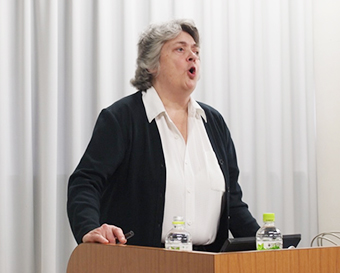
Director Linda von Hoene from UCB
The University of California, Berkeley (UCB) is making advanced efforts to develop their teaching assistant system. At UCB, TAs are called Graduate Student Instructors (GSIs) and take on a wide range of responsibilities. UCB's established GSI Teaching & Resource Center trains, coordinates, and manages teaching assistants. Tokyo Tech's Institute for Liberal Arts working group invited the directors of the center, Dr. Linda von Hoene and Dr. Sabrina Soracco, to hold a lecture and workshop in Tokyo on March 23-24.
UCB: Over 25 years of TA development
The directors' visit to Tokyo Tech began with a lecture on the history and development of TAs. Teaching assistants date back to the 1940s when educational institutions in the US began employing them in an attempt to solve the problem of big class sizes. This led to criticism from parents who doubted the competency of TAs. In 1989, UCB founded the GSI Teaching & Resource Center in order to better prepare graduate students for teaching.
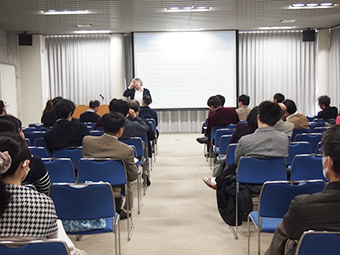
Lecture on TA development
Today, 1,800 TAs teach classes at UCB during any given semester. 74 percent of the classes have less than 30 students, and large courses may be taught by multiple TAs. In addition to teaching, duties also include course planning, office hours, and grading. Faculty members provide support based on a campus-wide policy on mentoring TAs, the directors explained.
An animated question-and-answer session lasting more than 50 minutes followed the lecture. With 33 faculty members from Tokyo Tech and other institutes participating, this was an excellent opportunity to obtain information on faculty mentoring policies and the work and future careers of teaching assistants, something of great interest to Tokyo Tech as it pushes ahead with its education reforms.
Case study discussion for Tokyo Tech faculty
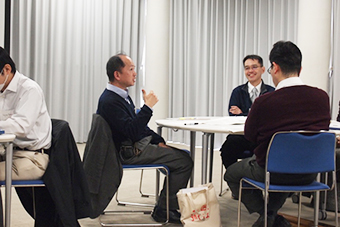
Case study discussion
After the lecture, Tokyo Tech faculty members to be affiliated with the Institute for Liberal Arts gathered for a TA-themed case study discussion. Participants were given specific cases involving faculty, student, and TA activity with the aim of identifying potential problems, the causes of these problems, and possible solutions. Points raised included the importance of clear communication and a concrete definition of TA duties in writing. Based on specific examples, faculty members also discussed ethical issues, potentially problematic and harassing behavior, and effective mentoring to avoid this type of behavior.
Student Workshop: What are good classes?
On March 24, twelve Tokyo Tech undergraduate and graduate students aiming to hone their teaching skills participated in a workshop run by Dr. von Hoene and Dr. Soracco.
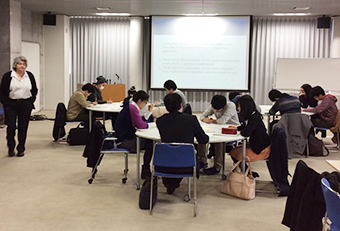
Student workshop teams
The aim of the workshop was to think about what makes a good class. After some discussion in groups, representatives were asked to not only share group answers but also clearly justify their opinions.
The lecturers explained that as the paradigm shifts from teaching to learning, students are also shifting from passively absorbing information to active learning. Therefore, it is important to design courses based on the academic competencies that can be acquired upon completion of these courses, the lecturers suggested.
A topic of great interest for many students was grading rubrics. In pairs and groups, participants discussed the advantages, criteria, and design of grading rubrics. The discussion proved a difficult challenge for both students and attending faculty, but as the session progressed everyone proactively voiced their opinions. After the workshop, an open discussion followed. Dr. von Hoene and Dr. Soracco answered a variety of questions from the participants.
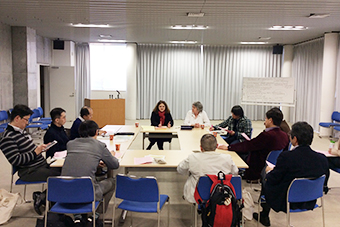
Open discussion
Tokyo Tech faculty members attending the workshop reaffirmed the significance of offering an educational program where graduate students have an opportunity to work as TAs. They felt that a teach-and-learn environment at the Institute would naturally encourage students to be more proactive and lead classes as TAs. While raising expectations for TA development, the need for professional development for faculty was also acknowledged. For students, the workshop was another great experience in active learning.
. Any information published on this site will be valid in relation to Science Tokyo.








